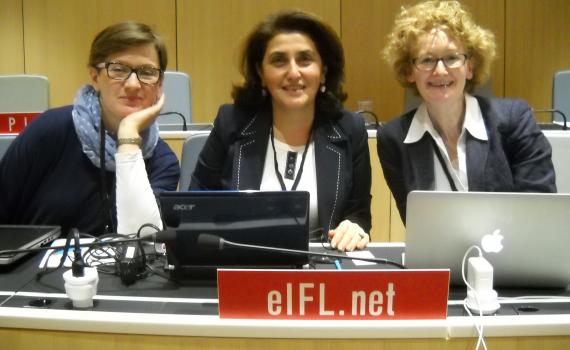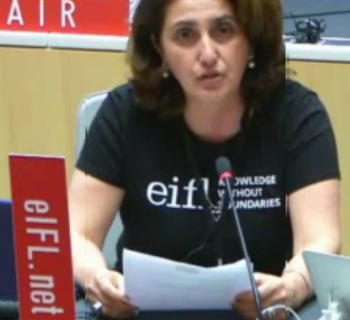
We really didn’t know what to expect from the last WIPO meeting of 2014. Two previous sessions of the Standing Committee on Copyright and Related Rights (SCCR) had failed to reach agreement on its work, mainly due to opposition from the European Union and other high-income countries to the inclusion of libraries and archives on its agenda, that also led to a breakdown at the WIPO General Assemblies in October 2014. The ability of the World Intellectual Property Organization (WIPO) to remain relevant to libraries and their users in the digital environment was becoming questionable.
As it turned out, member states pulled back from the brink at the recent session of SCCR that took place in Geneva from 8-12 December 2014, under the stewardship of the new WIPO Deputy Director General, Culture and Creative Industries Sector, Ms Anne Leer, and in the elegant surroundings of the new conference centre. During the week delegates were treated to a marathon question and answer (Q&A) session with the author of the updated WIPO study on libraries and archives, a new document with consolidated proposals on libraries and archives was introduced by Brazil, and the SCCR Chair, Mr. Martin Moscoso, deftly sidestepped previous political disagreements with a new ‘tool’ (that turned out to be a chart). In a sign that things might end smoothly, the sessions ran to time each day with a 18:39 finish on Friday (instead of the early hours of Saturday morning).
 I was in Geneva to represent EIFL together with EIFL copyright librarians Barbara Szczepanska from Poland and Hasmik Galystan from Armenia, who was attending SCCR for the first time. During a busy week, EIFL’s first intervention consisted of three questions to Prof Kenneth Crews, the WIPO study author, on the fact that 18% of countries, including five EIFL partner countries, have no exceptions for libraries and over one third – located almost totally in the developing world – still do not have an exception allowing libraries to make copies of their works for users. Then Hasmik Galystan made a personal plea for a global exception for inter-library document supply so that libraries in Armenia and other countries can properly support education and learning. (At the request of the Chair, NGO statements on this item were submitted in writing).
I was in Geneva to represent EIFL together with EIFL copyright librarians Barbara Szczepanska from Poland and Hasmik Galystan from Armenia, who was attending SCCR for the first time. During a busy week, EIFL’s first intervention consisted of three questions to Prof Kenneth Crews, the WIPO study author, on the fact that 18% of countries, including five EIFL partner countries, have no exceptions for libraries and over one third – located almost totally in the developing world – still do not have an exception allowing libraries to make copies of their works for users. Then Hasmik Galystan made a personal plea for a global exception for inter-library document supply so that libraries in Armenia and other countries can properly support education and learning. (At the request of the Chair, NGO statements on this item were submitted in writing).
Later in the week in a statement on the agenda item on persons with other disabilities, we highlighted the important point that the Marrakesh Treaty does not restrict the granting of rights to persons with other disabilities who need alternative formats in order to access information, a recommendation in the EIFL guide to the Marrakesh Treaty for persons with print disabilities to ensure equal treatment to all persons regardless of their disability.
Substantive discussion on libraries and archives began on Wednesday afternoon when Prof. Kenneth Crews presented the main facts and figures in the updated study on limitations and exceptions. (Prof. Crews kindly thanked EIFL for helping to provide some of the statutes in the updated report). A key message from Prof. Crews is that WIPO should take the lead on copyright limitations and exceptions for libraries and archives “before the debate, and the solution are left to other actors”. In particular, Prof. Crews suggested that one of the single most important things that WIPO can address is the issue of cross-border activities by libraries, and the difficulty of trans-border cooperation when national laws are so diverse. For example, when a researcher in one country would like to request a copy of an article from a library in another country, or a library in one country that is allowed under law to have a preservation copy, would like to request the digital file from a library in another country.
Prof. Crews called for “original thinking” on this task. There was much food for thought in the considered and careful answers given to the many questions raised over the following day by member states Italy, Russia, Saudi Arabia, Mexico, France, the EU, the Czech Republic, Tunisia, Brazil, Kenya, Tanzania, Sudan, Israel, Guatemala, Chile, Ecuador, Spain, Swedan, Algeria, Japan, Senegal, China, Thailand, Latvia, Zimbabwe, Togo, the USA, Iran, Sri Lanka, Malawi and Belgium, as well as by NGOs.
On Friday morning, Brazil presented a new consolidation of proposals prepared by African Group, Brazil, Ecuador, India and Uruguay on the eleven topics contained in the Committee’s working paper on libraries and archives. While acknowledging that not all member states want to discuss limitations and exceptions on the same terms, Brazil indicated that the new document is open to other member states to join, or to seek clarification on any of the issues.
And the Chair unveiled his new tool: a chart with the eleven topics on libraries and archives together with the outcomes adopted by the Committee (set out in previous SCCR conclusions). In a methodology that is also being used in negotiations on the proposed treaty on broadcasting, the idea is to reach a common understanding on the specific topics focusing on areas of consensus. The Chair’s chart was received with interest by member states who will consider the approach for the next SCCR.
Finally in an attempt to avoid the disagreements that have dogged recent SCCRs, the Chair produced his own summary of the meeting rather than trying for the Committee to reach consensus conclusions. While accepting factual corrections to his summary, the Chair stated his no-nonsense intention from the outset, “I am not here to make all of you happy”.
However, by skilfully managing discussion on the proposed broadcast treaty and on limitations and exceptions - that enabled SCCR to end the year on a reasonably positive note, and at a reasonable hour - he may in fact have done just that!
FURTHER READING
- EFF: Libraries Face Off Against Publishers and the European Union at WIPO
- IP Watch: Copyright Exceptions For Libraries: WIPO Should Step Up Before Someone Else Does, Researcher Says
- WIPO Study on Copyright Limitations and Exceptions for Libraries and Archives
- Presentation of the WIPO Study on Copyright Limitations and Exceptions for Libraries and Archives.
- Consolidation of Proposed Texts Contained in Document SCCR/26/3 prepared by African Group, Brazil, Ecuador, India and Uruguay
- WIPO SCCR/29 Summary by the Chair
- Webcast of the Standing Committee on Copyright and Related Rights: Twenty-Ninth Session - December 8 to December 12, 2014
- EIFL photos of SCCR/29 on Flickr
SHARE / PRINT







